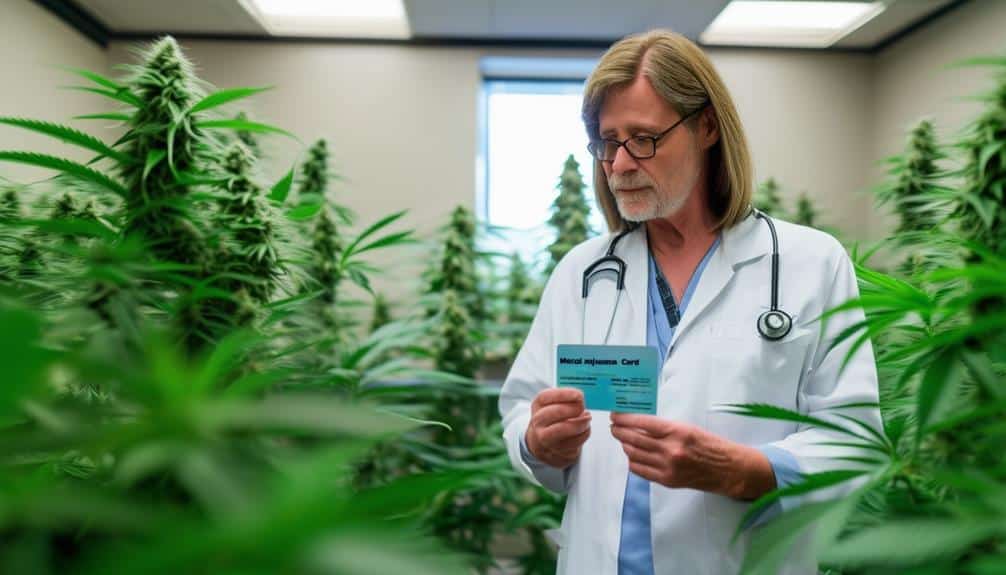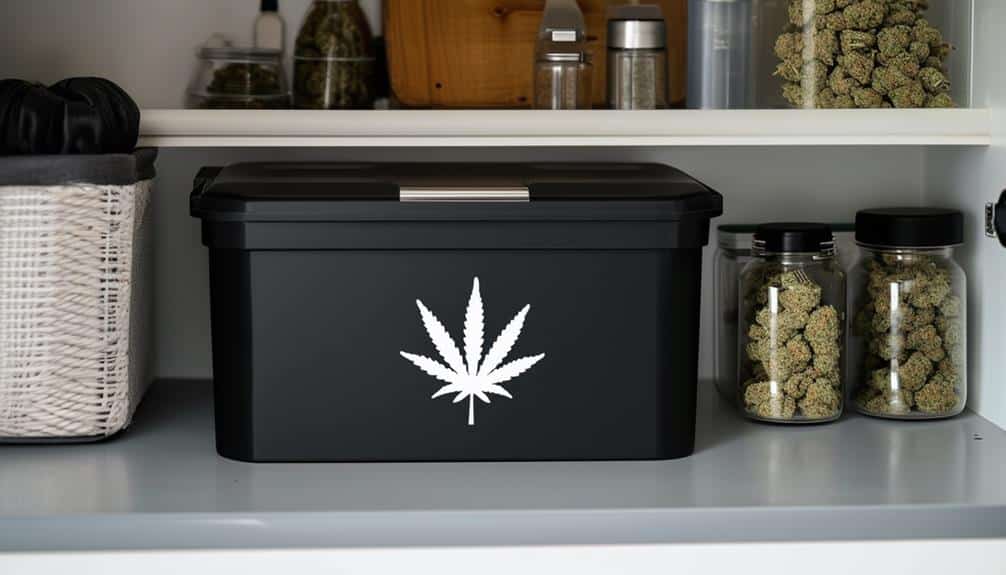Imagine you’re managing chronic pain and your healthcare provider recommends medical marijuana as part of your treatment plan in Delaware. To truly benefit, you need to navigate a few key steps, starting with obtaining a medical marijuana card and selecting the right dispensary. Understanding different strains and consumption methods can greatly impact your relief. You’ll also want to track your experiences to fine-tune your regimen. But how do you ensure you’re maximizing this treatment option? Let’s explore the essential strategies to optimize your medical marijuana use.
Delaware Cannabis Laws

In Delaware, understanding the nuances of cannabis laws is crucial for maximizing the therapeutic benefits of medical marijuana. As you navigate these laws, it’s important to distinguish between medical and recreational use.
Although Delaware hasn’t legalized recreational use, the state’s medical marijuana program is well-established, offering relief to patients with specific conditions.
The impact on the economy is significant as the medical marijuana industry creates jobs and generates tax revenue. However, without recreational legalization, economic benefits seen in states with both are not fully realized here.
Staying informed about these economic elements helps you understand the broader implications of cannabis laws.
Public perception plays a critical role in shaping these laws. Medical research increasingly supports the therapeutic benefits of cannabis, gradually shifting public opinion toward acceptance.
If you’re dedicated to serving others, it’s important to be aware of how evolving research influences both legislation and societal attitudes.
Staying informed about these aspects allows you to better advocate for patients and ensure they receive the care they need.
Qualifying Conditions
Understanding the legal landscape sets the stage for identifying specific medical conditions that qualify patients for Delaware’s medical marijuana program. To determine patient eligibility, Delaware has outlined a list of qualifying conditions. These include chronic pain, severe nausea, and persistent muscle spasms, among others. Cancer, HIV/AIDS, and multiple sclerosis are also on the list, reflecting the state’s recognition of potential symptom relief and improved quality of life.
To gain access to medical marijuana, you need a physician’s approval. This involves a thorough evaluation where the doctor confirms that your condition aligns with the state’s criteria. The physician will assess the severity and frequency of your symptoms and how they impact your daily activities. If deemed eligible, the physician will then provide a written certification.
This process ensures that only those who genuinely require medical marijuana for symptom relief can access it. By adhering to these guidelines, Delaware aims to provide a structured evidence-based approach to improving patients’ quality of life.
It’s crucial to consult with a knowledgeable healthcare provider to navigate this process and ensure you’re meeting all requirements for patient eligibility and physician approval.
Obtaining a Card

Obtaining a medical marijuana card in Delaware involves an exacting and regulated process designed to ensure patients receive appropriate care and access.
First, you need to consult with a licensed physician to confirm that you have a qualifying condition. Once your eligibility is verified, the card application process begins. Your physician will need to provide written certification, which you’ll submit along with your application to the Delaware Department of Health and Social Services (DHSS).
The application itself is straightforward but must be completed accurately to avoid delays. Ensure all required documentation, such as proof of residency and identification, is included. The DHSS will review your application and if approved, issue your medical marijuana card.
Cost coverage is an important consideration. While the state charges a fee for processing applications, some insurance plans may cover part or all of the related medical consultation fees. Additionally, there are programs available for low-income patients that can help offset costs. It’s vital to explore all available options to minimize out-of-pocket expenses.
Choosing Dispensaries
After securing your medical marijuana card, the next step involves selecting a dispensary that aligns with your medical needs and preferences. Start by conducting a thorough dispensary comparison considering factors like location convenience. Opt for a dispensary that’s easily accessible minimizing travel time especially if frequent visits are necessary.
Evaluate product availability as it directly impacts your treatment plan. A reputable dispensary should offer a wide range of medical marijuana products ensuring you have access to specific treatments prescribed by your healthcare provider. Check their inventory online or call ahead to confirm they carry the products you need.
Pricing options are another critical aspect to consider. Research different dispensaries to compare prices for similar products. Some dispensaries might offer discounts or loyalty programs that can help manage costs effectively. Remember, the goal is finding balance between quality and affordability.
Lastly, review customer feedback and ratings to gauge the dispensary’s reputation and service quality. Positive reviews can indicate reliable product availability and fair pricing options, enhancing your overall experience. Making an informed choice will ensure your medical marijuana journey is both effective and convenient.
Selecting Strains

Selecting the right strain of medical marijuana is essential for effectively addressing your specific medical condition and symptoms. To achieve the best results, you need to understand the effects and potency of various options. Different strains are bred to target distinct ailments; for instance, Indica strains are often known for their sedative effects making them ideal for pain relief and insomnia, while Sativa strains tend to provide an uplifting energetic experience suitable for conditions like depression and fatigue.
Equally important are the terpene profiles and flavor of the strains. Terpenes are aromatic compounds found in cannabis that not only contribute to the plant’s scent and taste but also enhance its therapeutic effects. For example, a strain high in myrcene might offer a musky earthy flavor promoting relaxation whereas a strain rich in limonene could boast a citrusy zest elevating mood.
When selecting a strain consider both its cannabinoid content (like THC and CBD) as well as its terpene profile to tailor effects to your needs. Consulting with knowledgeable dispensary staff can guide you in choosing a strain that aligns with your medical requirements ensuring the most beneficial enjoyable experience.
Proper Dosage
Understanding the correct dosage is important to harness the full benefits of medical marijuana after selecting the appropriate strain for your condition. Dosage guidelines are crucial to guarantee you receive therapeutic benefits without experiencing adverse effects.
Start with a low dose and gradually increase it. This method, commonly referred to as ‘start low and go slow,’ allows your body to acclimate to the cannabinoid effects while avoiding overdose.
Consult with a healthcare provider experienced in medical marijuana to establish a personalized dosage plan. Factors like your weight, metabolism, and severity of your condition play a significant role in determining the best dosage. Evidence suggests that patients often experience relief at lower doses making it vital to monitor your body’s response closely.
Keep a journal recording your dosage, time of consumption, and effects you experience. This practice not only helps adjust intake but also provides valuable data for your healthcare provider refining dosage guidelines.
Consumption Methods

Exploring different consumption methods is essential for enhancing efficacy and experience of medical marijuana in Delaware. Understanding benefits and applications of each method can help provide better guidance and care for those in need.
Vaping offers immediate relief due to rapid absorption through lungs. It’s a preferred method for conditions requiring quick symptom management and avoids harmful by-products associated with smoking.
In contrast an edibles guide will inform you that ingesting marijuana results in slower onset but provides longer-lasting effects making it suitable for chronic pain and sleep disorders.
Tinctures, which are alcohol-based cannabis extracts, offer the advantage of precise dosing and can be administered sublingually for quick absorption or added to food and beverages. This flexibility makes tinctures a versatile option for various patient needs.
Additionally, topical usage is ideal for localized relief without psychoactive effects making them effective for treating conditions like arthritis, muscle pain, and skin disorders.
Managing Side Effects
Effectively managing side effects of medical marijuana requires a thorough understanding of its pharmacological interactions and patient-specific factors. To enhance symptom management it’s essential to monitor and adjust your dosage based on how your body responds.
Here are key strategies to keep in mind:
- Symptom Management: Keep a detailed log of your symptoms and side effects to help your healthcare provider tailor your treatment plan.
- Dosage Adjustments: Start with a low dose gradually increasing it to find the best balance that minimizes side effects.
- Lifestyle Changes: Incorporate healthy habits like proper hydration balanced nutrition, and regular exercise to lessen adverse effects.
- Alternative Therapies: Complement medical marijuana with other therapies such as acupuncture physical therapy or mindfulness practices.
- Education and Support: Stay informed about potential side effects seek support from healthcare professionals and patient communities.
Safe Storage

After addressing management of side effects, proper storage of medical marijuana becomes essential to guarantee its effectiveness and safety. Adhering to effective storage tips promotes product longevity allowing patients to benefit fully from their medication.
First, always store medical marijuana in a cool dark place away from direct sunlight which can degrade cannabinoids and terpenes. Optimal temperature and humidity levels are crucial; aim for a range of 60-70°F and 55-62% relative humidity to prevent mold and mildew.
Safety precautions are equally important. Utilize airtight opaque containers to maintain potency and protect the product from light and air exposure. Childproofing methods can’t be overstressed. Store marijuana in child-resistant containers keep them in high locked cabinets to prevent accidental ingestion by children or pets. Educate household members about the importance of these measures fostering a secure environment.
Additionally avoid common mistakes like storing medical marijuana in plastic bags which can cause static degrading trichomes instead choose glass jars with airtight seals.
Legal Considerations
Understanding the legal framework surrounding medical marijuana in Delaware is crucial for guaranteeing compliance mitigating potential legal risks. As a caregiver patient or medical professional you need to be aware of specific regulations that govern use of medical marijuana in the state. Delaware’s medical marijuana program has clear guidelines but comprehending them requires attention to detail.
Here are some critical aspects to keep in mind:
- Eligibility Requirements: Verify that the patient meets criteria under Delaware law which includes having a debilitating medical condition.
- Possession Limits: Be mindful of legal limits for possession avoiding potential legal issues. The state allows up to six ounces for a 14-day period.
- Insurance Coverage: Recognize that while medical marijuana is legal it’s not covered by insurance necessitating out-of-pocket expenses.
- Workplace Policies: Familiarize yourself with employer policies regarding medical marijuana use. Some workplaces may have zero-tolerance policies.
- Legal Protections: Delaware law provides certain safeguards against discrimination for medical marijuana users but these protections have boundaries.
Being well-informed about these legal aspects can help you make better decisions for yourself or those you’re caring for fostering a safer more compliant experience with medical marijuana in Delaware.
Conclusion
To maximize the benefits of medical marijuana in Delaware always consult your healthcare provider explore various dispensaries and understand effects of different strains and consumption methods.
Keep a detailed journal to track your progress adjust dosages gradually and incorporate healthy habits. By doing so you’ll be well on your way to achieving the best relief and living your best life.
Remember knowledge is power—don’t be uninformed stay proactive in managing your health.
If you’re looking for more personalized advice or have any questions why not visit Cannabis Docs of Delaware?
We’re here to help navigate your medical marijuana journey. Feel free to give us a call at (855) 420-6797. We’re always happy to chat and provide the information you need.
The post How to Maximize the Benefits of Medical Marijuana in Delaware appeared first on Delaware Cannabis Docs.
source https://delawarecannabisdocs.com/how-to-maximize-the-benefits-of-medical-marijuana-in-delaware/

No comments:
Post a Comment